Pololu Carrier with Sharp GP2Y0A60SZLF Analog Distance Sensor 10-150cm, 5V
Description
The GP2Y0A60SZ distance sensor from Sharp offers a wide detection range of 4″ to 60″ (10 cm to 150 cm) and a high update rate of 60 Hz. The distance is indicated by an analog voltage, so only a single analog input is required to interface with the module. The sensor ships installed on our compact carrier board, which makes it easy to integrate this great sensor into your project, and is configured for 5V mode.
Overview
Sharp’s distance sensors are a popular choice for many projects that require accurate distance measurements. This particular sensor is small and affordable, making it an attractive alternative to sonar rangefinders, while its wide sensing range and resistance to interference from ambient IR set it apart from other IR distance sensors. It consists of a Sharp GP2Y0A60SZLF module installed on our compact carrier board, which includes all of the external components required to make it work and provides a 0.1″ pin spacing that is compatible with standard connectors, solderless breadboards, and perfboards. With an ability to measure distances from as close as four inches to as far as five feet (10 cm to 150 cm), this sensor has the widest range of any of our Sharp distance sensors, and its 60 Hz update rate is more than twice that of Sharp’s older GP2Y0A02YK0F analog distance sensor that has a similar sensing range.
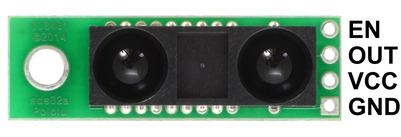 |
Interfacing to most microcontrollers is straightforward: the single analog output, OUT, can be connected to an analog-to-digital converter for taking distance measurements, or the output can be connected to a comparator for threshold detection. The sensor automatically updates the output approximately every 16 ms. The enable pin, EN, can be driven low to disable the IR emitter and put the sensor into a low-current stand-by mode. This pin is pulled high on the carrier board through a 10 kΩ pull-up resistor to enable the sensor by default.
A 1×4 strip of 0.1″ header pins and a 1×4 strip of 0.1″ right-angle header pins are included, as shown in the picture below. You can solder the header strip of your choice to the board for use with custom cables or solderless breadboards, or you can solder wires directly to the board itself for more compact installations. The board features one 0.125″ mounting hole that works with #4 or M3 screws (not included); if you do not need the mounting hole, you can cut that part of the board off to reduce its size.
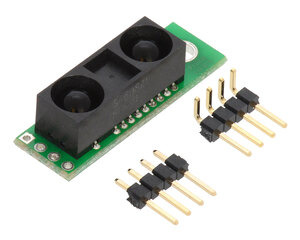 |
5V and 3V versions
The GP2Y0A60SZ supports two operating modes: 5V and 3V. In 5V mode, the recommended operating voltage is 2.7 V to 5.5 V, and the output voltage differential over the full distance range is approximately 3 V, varying from around 3.6 V at 10 cm to 0.6 V at 150 cm. In 3V mode, the recommended operating voltage is 2.7 V to 3.6 V, and the output voltage differential over the full distance range is approximately 1.6 V, varying from around 1.9 V at 10 cm to 0.3 V at 150 cm. The GP2Y0A60SZ datasheet (701k pdf) contains a plot of analog output voltage as a function of the distance for the two modes.
Our GP2Y0A60 carrier board is available configured for 5V mode or configured for 3V mode:
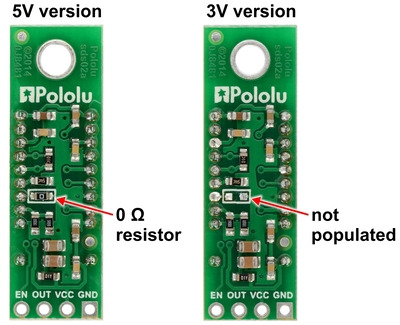 |
The only difference between the two versions is the presence or absence of a zero ohm resistor as shown in the picture above (the component location is marked by a rectangle on the silkscreen). You can convert a 5V version to 3V by removing the resistor, and you can convert a 3V version to 5V by shorting across the two pads.
Note that the 5V version can be powered all the way down to 2.7 V, and the relationship between the sensor output voltage and distance is mostly independent of the supply voltage. The main drawback to powering the 5V version at a lower voltage is the output voltage will not exceed the supply voltage, so the effective minimum detection distance might increase (i.e. for distances that would result in output voltages above your supply voltage, the output will instead be capped at the supply voltage). On the other hand, if you mostly care about measuring distances closer to the maximum end of the range, you could benefit from the increased output voltage differential of the 5V version even if you are only powering it at 3.3 V.
Feature summary
-
Operating voltage:
- 5V version: 2.7 V to 5.5 V
- 3V version: 2.7 V to 3.6 V
- Average current consumption: 33 mA (typical)
- Distance measuring range: 10 cm to 150 cm (4″ to 60″)
- Output type: analog voltage
- Output voltage differential over distance range:
- 5V version: 3.0 V (typical)
- 3V version: 1.6 V (typical)
- Update period: 16.5 ± 4 ms
- Enable pin can optionally be used to disable the emitter and save power
- Size without header pins: 33 mm × 10.4 mm × 10.2 mm (1.3″ × 0.41″ × 0.4″)
- Weight without header pins: 2.5 g (0.09 oz)
Schematic diagram
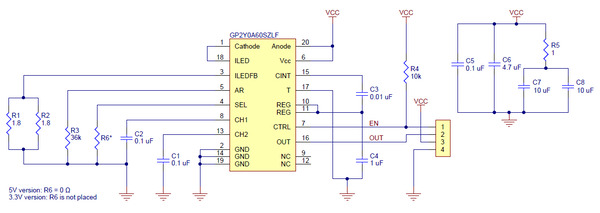 |
The above schematic shows the additional components the carrier board incorporates to make the GP2Y0A60SZLF easier to use. This schematic is also available as a downloadable pdf (142k pdf).
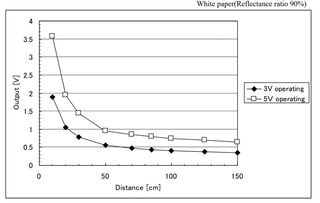 |
Linearizing the output
The relationship between the sensor’s output voltage and the inverse of the measured distance is approximately linear over the sensor’s usable range. A graph of the output voltage over the usable distance to a reflective object can be found in the GP2Y0A60SZLF datasheet (701k pdf). You can convert the sensor output voltage to an approximate distance by constructing a best-fit line that relates the inverse of the output voltage (V) to distance (cm).
Alternative Sharp distance sensors
We carry several other Sharp distance sensors, including the shorter range Sharp GP2Y0A41SK0F analog distance sensor (4 – 30 cm) and Sharp GP2Y0A21YK0F analog distance sensor (10 – 80 cm). With regard to performance, this GP2Y0A60SZ is most similar to the Sharp GP2Y0A02YK0F analog distance sensor (20 – 150 cm), but the GP2Y0A60SZ offers a lower minimum detection distance and more than twice the sampling rate in a much smaller package:
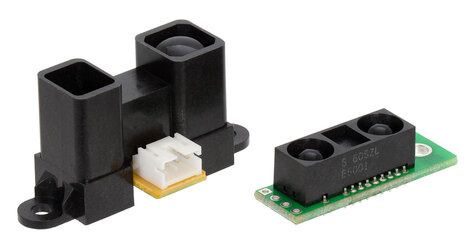 |
|
Sharp GP2Y0A02YK0F Sensor 20-150cm (left) next to Pololu Carrier with Sharp GP2Y0A60SZLF Sensor 10-150cm (right). |
|---|
We also carry three digital Sharp distance sensors that have lower minimum detection distances, quicker response times, lower current draws, and much smaller packages; they are available with a 5 cm, 10 cm, or 15 cm maximum detection distance and simply tell you if something is in their detection range, not how far away it is.
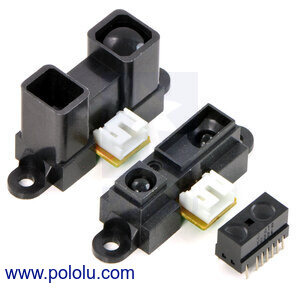 |
|
A variety of Sharp distance sensors. |
|---|
Dimensions
| Size: | 1.3″ × 0.41″ × 0.4″1 |
|---|
General specifications
| Maximum range: | 150 cm |
|---|---|
| Minimum range: | 10 cm |
| Sampling rate: | 60 Hz3 |
| Minimum operating voltage: | 2.7 V |
| Maximum operating voltage: | 5.5 V |
| Supply current: | 33 mA4 |
| Output type: | analog voltage |
| Output voltage differential: | 3 V |
Notes:
1. Without included optional headers. If the mounting hole is not needed, that part of the board can be cut off to decrease the length by 0.3″.
2. Without included optional headers.
3. Typical; can be as low as 50 Hz.
4. Average; this sensor draws current in large, short bursts.
Enter the code in the box below:
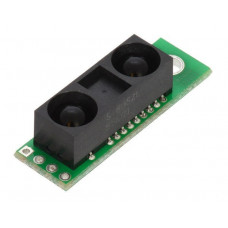







-80x80.jpg)
